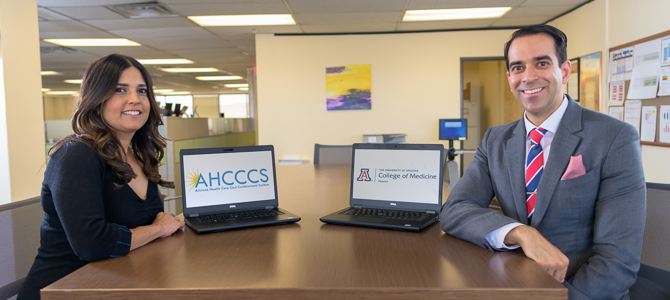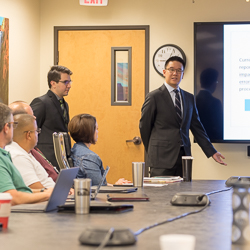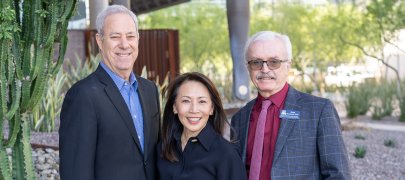
UA Partners with AHCCCS to Improve Health Care

The University of Arizona College of Medicine – Phoenix’s Clinical Informatics Fellowship has partnered with the Arizona Health Care Cost Containment System (AHCCCS) to combine their knowledge within the informatics realm to improve health care delivery for Medicaid patients.
On May 1, 2018, two of the College’s Clinical Informatics Fellows began a four-month quality improvement and data analytics rotation at AHCCCS.
“As clinical informaticians, we are integrating information technology and data into how we operate as a health care system,” said Hamed Abbaszadegan, MD, MBA, program director of the Clinical Informatics Fellowship. “This partnership with AHCCCS will examine how to streamline data collection, so that health care providers have more robust information at their fingertips and are better able to treat patients holistically.”
AHCCCS, Arizona’s Medicaid program, is the single largest insurer in the state, covering 1.9 million adults and children who live near or below the poverty level.

“The clinical expertise that the fellows bring to this partnership will help AHCCCS leverage existing resources and improve services to our communities.”
The fellows will be involved in multiple projects during their four-month rotation, including looking for improvement opportunities in the Early and Periodic Screening, Diagnostic and Treatment (EPSDT) Tracking Form. This tracks timely access to care, screening and preventive services such as immunizations, dental care and lead screening. Much of this data is entered manually by the provider, rather than being incorporated in the electronic health record. The fellows hope to standardize the process, which would save a lot of administrative time on the provider and health plan level.
“Complex data analysis of health information will benefit all of us,” Dr. Abbaszadegan said. We can learn a lot by directly visualizing trends from huge subsets of populations. The care delivery models created out of this can improve health care for everyone.”
The college’s Clinical Informatics Fellowship, which was the fifth accredited program in the country, is a new subspecialty designed to prepare physicians for a career in clinical informatics. It provides training to develop a cadre of clinical informaticians who are adept at integrating people, processes and platforms to improve the quality, safety and efficiency of health care.
“We are forging links between medical education and what the state is doing for its patients,” Dr. Abbaszadegan said. “No matter your role in health care in Arizona, you are going to see patients of AHCCCS. From the medical student, intern, resident or attending physician level, the new health care delivery models that we create together will change how we practice medicine.”
Dr. Salek added that, while AHCCCS is one of most cost-efficient Medicaid programs in the country, clinical informatics has the potential to further streamline the health care delivery system.
“The future of medicine incorporates clinical informatics data to help make sustainable, programmatic decisions,” Dr. Salek said. “This partnership will explore ways that technology can reduce the administrative burden and better serve patients.”
About the College
Founded in 2007, the University of Arizona College of Medicine – Phoenix inspires and trains exemplary physicians, scientists and leaders to optimize health and health care in Arizona and beyond. By cultivating collaborative research locally and globally, the college accelerates discovery in a number of critical areas — including cancer, stroke, traumatic brain injury and cardiovascular disease. Championed as a student-centric campus, the college has graduated more than 800 physicians, all of whom received exceptional training from nine clinical partners and more than 2,700 diverse faculty members. As the anchor to the Phoenix Bioscience Core, which is projected to have an economic impact of $3.1 billion by 2025, the college prides itself on engaging with the community, fostering education, inclusion, access and advocacy.


